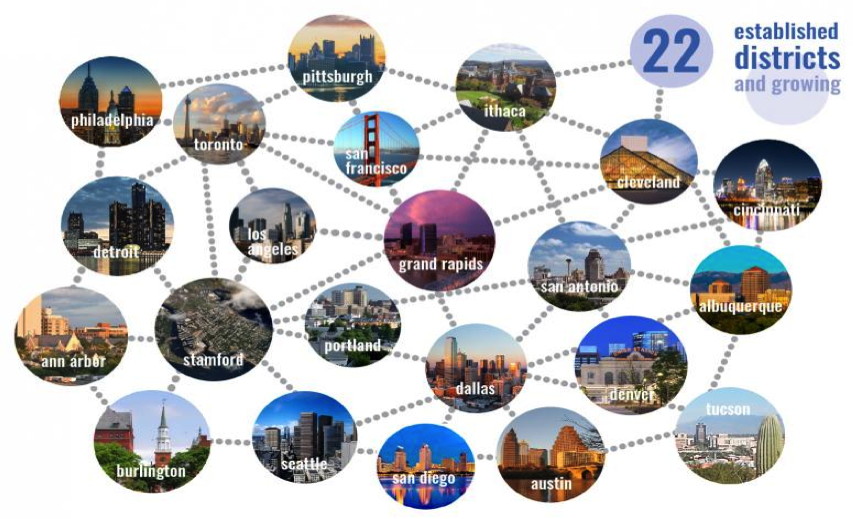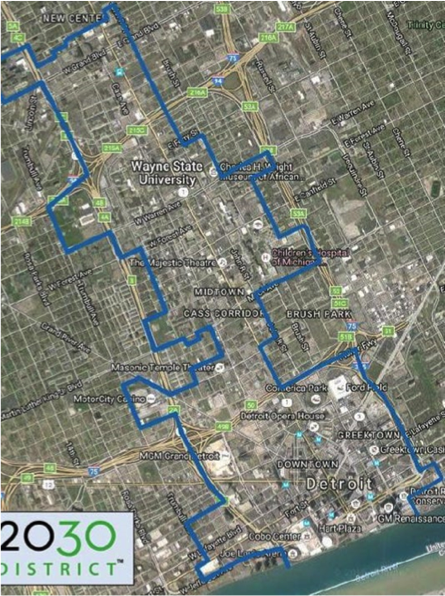
Detroit 2030 District – Communities That Save Energy Together, Flourish Together
August 15, 2019
Image credit: Architecture 2030
By Alexis Durocher. Alexis is a Marketing and Outreach Representative with Energy Sciences. The firm helps clients meet energy challenges with practical solutions that reduce waste and increase net operating income.
 We come together to build community gardens, so we can grow our own food. We come together to clean up parks, so our kids have safe places to play. Now it is time for us to come together to reduce our impact on the planet. And, we are doing just that.
We come together to build community gardens, so we can grow our own food. We come together to clean up parks, so our kids have safe places to play. Now it is time for us to come together to reduce our impact on the planet. And, we are doing just that.
In 2011, the 2030 District organization was created in Seattle, WA to establish a community of building owners and managers, industry professionals and community stakeholders to reduce greenhouse gases as well as wasted energy and water by 50% by the year 2030. Since then 21 additional Districts have been created, forming a Network across the country. Michigan holds three Districts: Grand Rapids, Detroit, and, most recently, Ann Arbor.
2030 Districts are public-private partnerships, which means that private businesses drive and are dedicated to the mission while the benefits extend to the general public. Districts are developed when a self-created group in a city applies for membership in the Network and gets local businesses to support the mission. Having private businesses involved ensures that the momentum in the program will continue as they incorporate 2030 District goals into their day-to-day business practices and building operating protocols.
Benefits of working to reduce energy as a whole community of stakeholders instead of as individuals include the support of peers and the sharing of best practices. Districts include a variety of professionals in energy related fields that help educate and guide fellow members on how they can each reach the 2030 goals. In addition to owners and managers of both public and private facilities, members include architects, engineers, contractors, energy consulting firms, renewable energy companies, and financial organizations that have loans specifically designed for energy saving projects. Along with a multitude of connections, the 2030 District also provides members with many educational opportunities. For example, the Detroit 2030 District offers:
ENERGY STAR Portfolio Manager Trainings
Many of the 2030 members are non-profit organizations, such as places of worship, that do not have full-time, dedicated energy managers monitoring their building energy use. Detroit’s 2030 District offers seminars that explain and demonstrate how to use this free, on-line tool to track and benchmark your energy and water usage like an expert, whether you’re an experienced energy manager or a novice.
Building Assessments
These studies tell building managers how their buildings systems are currently operating and give insight into where improvements can be made. The Detroit 2030 District assists members in identifying energy consultants that can provide building performance assessments, which are the foundation of any building energy management plan.
Quarterly Meetings
These meetings are held at a variety of venues within the District. Typically, they include a speaker addressing a specific topic in building energy management. They give members a chance to network and learn about new technologies and strategies for energy and water waste reduction.
Cohort Round Tables
Some of the energy management challenges that a restauranteur might face are uniquely different from those that an office building manager or artisan furniture-maker may deal with. During the cohort round-table sessions, members gather to discuss challenges, lessons learned, new initiatives and needs with others that have buildings similar to their own.
As a southeast Michigan-based firm, Energy Sciences sees itself as a stakeholder in the future of this area. That’s why we joined the Detroit 2030 District in 2018. As active members, we enjoy sharing our knowledge and expertise, and helping others to achieve their energy management goals. More specifically, Diana Nash, our Client Solutions Consultant, leads the membership committee because she enjoys meeting people and making sure they get connected with others that can help them to reach their energy efficiency potential.
If you think your facility’s energy management team can benefit from membership in the Detroit 2030 District, please contact me at [email protected] or 248-430-5568 for more information.





